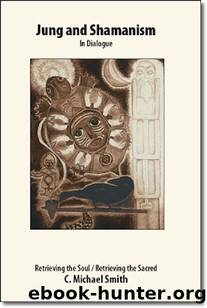Jung and Shamanism in Dialogue: Retrieving the Soul, Retrieving the Sacred by C. Michael Smith

Author:C. Michael Smith [Smith, C. Michael]
Language: eng
Format: epub
Tags: Pensamiento, Proceso creativo, Psicodelicos, Simbolos
Published: 2014-01-28T23:00:00+00:00
FORMS OF COMPLEXES
Complexes may manifest psychic or somatic aspects, or both. In conversion hysteria, the complex is behind the physical symptom. In perverted masturbatory fantasies, a complex is behind the perverted fantasy and the masturbatory compulsion. One ordinary form of complex has such a low energy charge that it seldom intrudes into consciousness, and does not operate independently of consciousness. Another form is the unconscious complex which is so swollen that it acts like a second ego-consciousness, and comes into conflict with the executive ego. Persons with this type of complex often feel caught between two competing value systems, truths, or streams of will. When a complex splits off dramatically from the larger organization of the psyche it becomes what Jung called autonomous, accounting for the phenomena of possession, dual and multiple personality (Janet), or dissociation into several partial personalities. Another form of harmful complex consists of identification with the complex, as in a mother or father complex. The values, opinions, dogmas, or wishes of the parent are carried around unconsciously. It is as if the individual were the mere instrument or mouthpiece of the parent. These individuals may not have the slightest idea of what is going on. The projected form of complex attributes the complex to an outward object or person, or to a spirit. Often these projected complexes are colored by the shadow qualities which the individual has not the courage to face. This form is observed in paranoia and in homophobia, and it is also believed to be present in primitive psychology, for example, in fetishism, totemism, and animism. A complex may also be intellectually conscious, but remain harmful because the individual is not wholeheartedly facing it, assimilating it emotionally, and bringing it into alignment with the adaptive purposes of the ego.
In the Jungian view, the inability or unwillingness to distinguish conscious from unconscious contents is psychologically risky, for it may prevent outward adaptation, thwart oneâs larger purposes, and interfere with human relationships and intimacy. The phenomenon which anthropologist Lucien Levy-Bruhl (1857-1939)38 called participation mystique, which, he observed, was characteristic of primitive psychology, is also characteristic of the effects of autonomous complexes. Participation mystique is basically the same as what object-relations psychoanalysts call projective identification, in which inner and outer events are merged or confused. It is basically an inability to distinguish inner from outer reality. It is found not only in primitive psychology, but also in the thought processes of children, and in modern neurotics. The stronger the tendency towards participation mystique, the less the ego is able to discriminate and delimit the inner and the outer. The result is increased vulnerability to inner or outer domination and loss of freedom.
Psychological health and maturity, for Jung, implies that the different parts of the psyche are consciously acknowledged, recognized, and brought into adequate (harmonious) relation to one another. Distinguishing and delimiting the different parts of the self is essential to such harmonious integration. It requires a strong ego, courage to become conscious and face the disagreeable contents of a complex.
Download
This site does not store any files on its server. We only index and link to content provided by other sites. Please contact the content providers to delete copyright contents if any and email us, we'll remove relevant links or contents immediately.
The Lost Art of Listening by Michael P. Nichols(7494)
Why I Am Not A Calvinist by Dr. Peter S. Ruckman(4148)
The Rosicrucians by Christopher McIntosh(3510)
Wicca: a guide for the solitary practitioner by Scott Cunningham(3167)
Signature in the Cell: DNA and the Evidence for Intelligent Design by Stephen C. Meyer(3130)
Real Sex by Lauren F. Winner(3014)
The Holy Spirit by Billy Graham(2944)
To Light a Sacred Flame by Silver RavenWolf(2814)
The End of Faith by Sam Harris(2733)
The Gnostic Gospels by Pagels Elaine(2527)
Waking Up by Sam Harris(2454)
Nine Parts of Desire by Geraldine Brooks(2360)
Jesus by Paul Johnson(2352)
Devil, The by Almond Philip C(2324)
The God delusion by Richard Dawkins(2305)
Heavens on Earth by Michael Shermer(2278)
Kundalini by Gopi Krishna(2180)
Chosen by God by R. C. Sproul(2161)
The Nature of Consciousness by Rupert Spira(2104)
